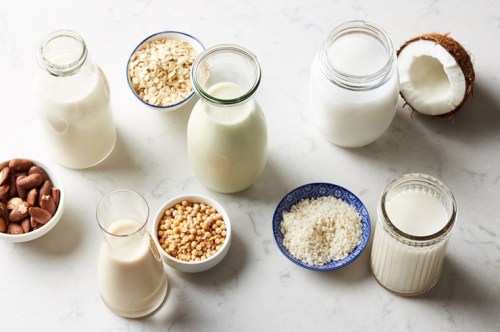Which type of healthy milk is the best for *you*?
A nutritionist shares the benefits of different types of milk, including full-dairy, almond, coconut, oat, and hemp.

Milk does a body good, all right. But not every body benefits from the same old cow’s milk. In fact, more than half of adults have trouble digesting lactose, the sugar found in milk, and symptoms can range from GI woes to skin reactions like rashes and acne to feeling bloated and uncomfortable.
But even if you can digest lactose like a pro, you may find another milk more in line with your dietary needs. And there are so many varieties—made from plants, nuts, and grains!—to try.
Gillean Barkyoumb, MS, RD, nutritionist and founder of Millennial Nutrition, lends her expertise to help you figure out which is the healthiest addition to your smoothies and granola.
Keep reading to see which type of milk is the best way for you to get the nutrients you need.

For protein: cow’s milk
“I don’t think we should be shaming cow’s milk,” says Barkyoumb. Packing eight grams of protein into every one-cup serving, moo juice can do more than lighten your coffee. “The high protein content from whey and casein helps build muscle, assists with weight maintenance, and keeps you fuller longer,” she says. And when you look at other high-protein options, soy milk has nearly double the fat as cow’s milk, and oat milk can clock in with as much as 20 grams of sugar per serving (yikes!).
For healthy fats: coconut milk
“What makes coconut milk stand out are the medium-chain triglycerides,” Barkyoumb says. For the non-nutritionists in the crowd, those are a type of fatty acid, and “early research suggests that they may be used for energy before they’re stored.” The healthy fats also give this milk a rich, creamy texture, and help you feel satisfied longer than some of the non-fat options, Barkyoumb says.
For fewer calories: almond milk
A one-cup pour packs about 40 calories, compared with about 120 in 2 percent cow’s milk (nearly 150 in whole!) or even 140 in hemp milk. “But you want to be careful to really look at the label,” Barkyoumb says. “Alongside the unsweetened cartons, you’ll find chocolate or vanilla options that contain more calories and sugar.” Almond milk is also delightfully low in fat (no cholesterol or saturated fat to speak of), but its low protein content means it won’t keep you as sated as other options.
For a vegan diet: hemp milk
All of the non-dairy alternatives are suitable for vegans, but hemp milk has a higher level of omega-3 fat than the others, which makes it a great pour for vegans looking for non-meat sources of this essentially fatty acid. “The only drawback is that it can be difficult to find, and it’s lower in protein and higher in calories than some of the other options,” says Barkyoumb. Another less-common option, rice milk, is probably worthy of a hard pass. “Rice milk has more sugar than these other milks and no protein whatsoever,” she says. Hemp milk might be higher in calories, but at least it’s giving you good stuff, too.
Want to try making your own nut milk at home? Here’s a quick and easy (no straining!) recipe for macadamia nut milk. And if you live a dairy-free life, here are 14 dinners you can make in less than 15 minutes.
Sign Up for Our Daily Newsletter
Get all the latest in wellness, trends, food, fitness, beauty, and more delivered right to your inbox.
Got it, you've been added to our email list.










